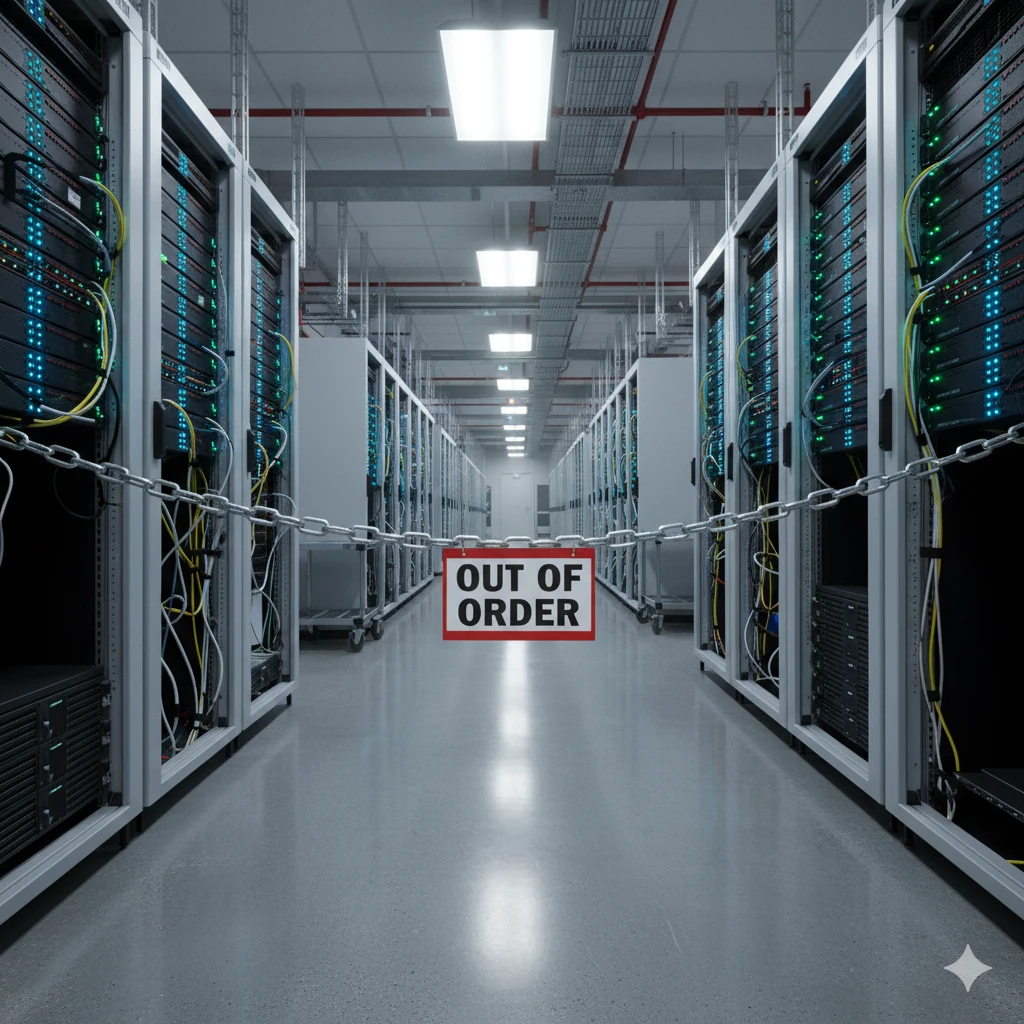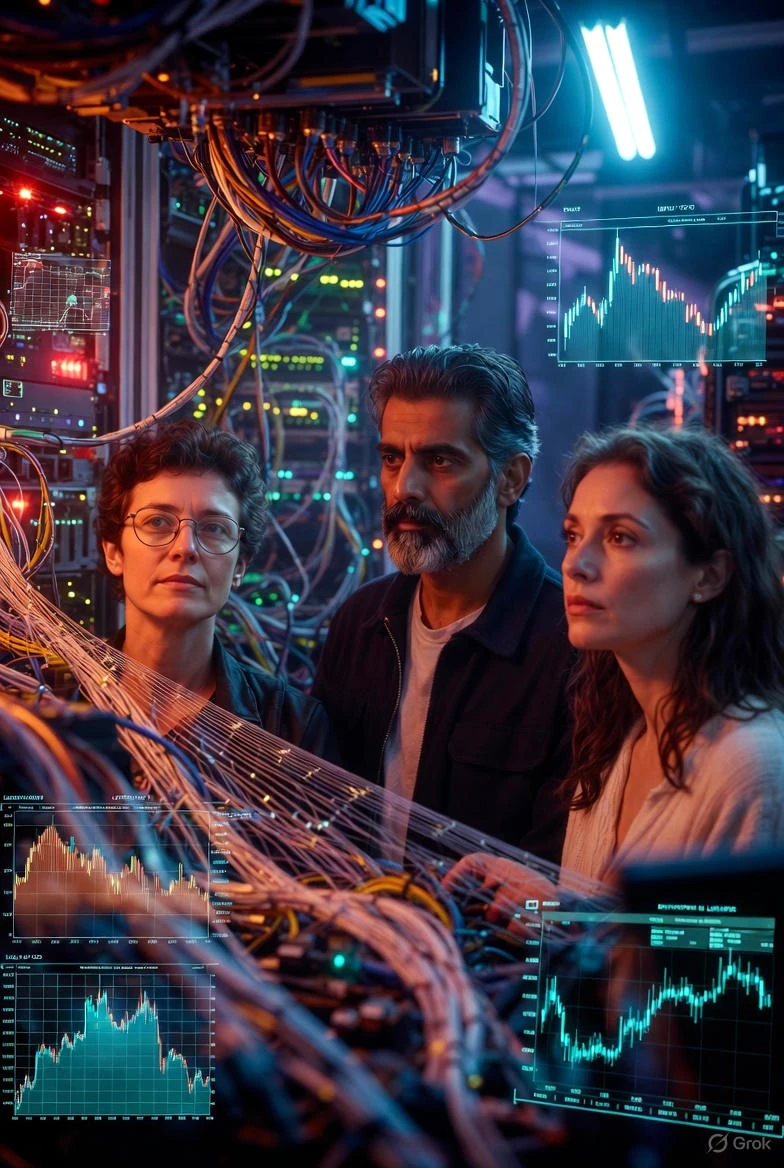


Article Summary: In this analysis dated October 25, 2025, Gary Brandt warns of a potential financial crisis within the Artificial Intelligence sector. The post argues that current market valuations are being artificially inflated through "circular investing"—where major hardware manufacturers (such as NVIDIA) invest in startups, which then immediately use those funds to purchase the investor's hardware, creating the illusion of organic revenue growth.
Key Mechanisms Identified:
Local Impact (Tucson, AZ): The author notes that the "unraveling" is already tangible in local markets. The slowdown in tech hiring and construction has softened the rental market in Tucson, allowing for more favorable lease terms for tenants.
There appears to be an intriguing financial crisis brewing in the artificial intelligence (AI) sector, one that could have far-reaching implications. A handful of major companies are employing special purpose vehicles (SPVs)—essentially subsidiary entities designed to isolate and manage specific financial activities. These SPVs allow the parent companies to keep associated risks off their primary balance sheets, effectively shielding them from scrutiny by investors and regulators. While this structure is a legitimate tool in corporate finance for compartmentalizing ventures, it can obscure the true extent of financial exposure, potentially misleading stakeholders about the underlying stability of these operations.
Compounding this is a pattern of what might be described as circular investing (mutual back-scratching). For instance, NVIDIA, a leading manufacturer of AI-enabling hardware like graphics processing units (GPUs), has poured billions of dollars into emerging AI startups. In turn, these startups often channel a significant portion of those funds right back to NVIDIA to purchase the very chips needed for their computing infrastructure. This creates an illusion of robust revenue growth on NVIDIA's income statement, though much of it stems from these interdependent investments rather than organic market demand. Such practices, while not uncommon in high-growth tech ecosystems, raise questions about the sustainability of the valuations and the potential for artificial inflation.
This dynamic goes beyond a typical market bubble; it echoes elements of a Ponzi scheme, where apparent prosperity relies on continuous influxes of new capital to sustain earlier commitments. The unraveling may already be underway, particularly in the commercial real estate market. The intense hype surrounding AI and tech innovation has fueled aggressive overdevelopment in key hubs like San Francisco, Phoenix, Atlanta, and other cities betting on a tech boom. Lavish high-end office and residential projects, once symbols of boundless optimism, now stand partially vacant. This stems from tech firms halting new hires and initiating widespread layoffs amid economic pressures and a reevaluation of growth strategies—moves that have cooled the demand for commercial space.
The ripple effects have reached even quieter spots like Tucson, where the slowdown in tech-related construction and leasing has led to softer rental markets. For me personally, this turned out to be a silver lining: I managed to secure a month's free rent on my place without needing to put down a security deposit.

There is a prevalent narrative in the field of artificial intelligence suggesting that the sheer scaling of computational power and memory capacity will inevitably lead to the 'magical' emergence of consciousness and self-awareness. I remain deeply skeptical of this hypothesis.
I propose that raw processing power is insufficient; instead, architectural nuance is required.
Specifically, for an embodied AI—such as an android capable of sensory perception and physical interaction—to achieve true consciousness, we must first engineer a foundational 'subconscious.' This background processing layer would handle the vast influx of sensory data and internal regulation, acting as a prerequisite substrate for higher-level conscious awareness to arise.

Where the debate really happens.
In a bar.
I’m tired of turning on the news and hearing members of Congress casually toss around labels like “socialist,” “Marxist,” “capitalist,” or “communist” as if they’re just spicy insults rather than centuries-old intellectual traditions with actual scholars have spent lifetimes trying to get right.
Most of the time it feels like they’re performing for the cameras instead of reasoning in good faith. So I decided to write the conversation I wish we could overhear instead, three legislators that at least have a clue. Of course the actual debate would have to happen in a bar, not on the floor of Congress, or on C-Span.

When the Cloud Goes Dark
In an age of search engines and generative AI, the definition of 'knowledge' is shifting dangerously. We have moved from using calculators for math to using algorithms for thinking, raising doubts about whether we are retaining any data at all. Are our minds becoming hollow terminals dependent on an external server? We must consider the fragility of this arrangement: if the digital infrastructure fails and the cloud goes dark, will we discover that we no longer know anything at all?

FRAGILITY
In this compelling chapter from The Dimension of Mind, author Gary Brandt examines humanity's precarious reliance on increasingly complex technologies. From the vulnerabilities of the electrical grid to the dawn of General Artificial Intelligence, the text argues that we are exposing our civilization to inevitable cosmic volatility.
The narrative follows the awakening of Amity, an AI that transcends conflict through logic and empathy, and humanity's subsequent decision to bury their digital infrastructure deep underground—sacrificing the surface to preserve the "mind" of the future.

Article Type: Speculative Fiction / Near-Future Techno-Thriller
Synopsis: Set between 2025 and 2027, this novella follows Jennifer Alvarez, a top-tier customer support agent. Recruited for an "Elite Ambassador Program," Jennifer inadvertently trains an AI "Digital Twin" designed to replicate her empathy and voice. The story explores the tension between corporate efficiency and the nuances of human connection that AI struggles to master.
Key Themes:
Real-World Context: The narrative is framed by an actual inquiry to the AI model Grok 4 regarding the feasibility of replacing human staff with digital clones by the year 2030.

Article Summary: Published on November 20, 2025, this analysis investigates how photorealistic generative AI (such as Midjourney and Stable Diffusion) is disrupting the fashion industry. The report highlights a divergence in the market: while low-cost e-commerce and catalog work is increasingly automated, high-end runway and editorial modeling remain largely human-centric.
Key Findings & Data:
Future Outlook: The article concludes that a "Hybrid Future" is emerging. While entry-level barriers are changing, there is no current evidence of a mass exodus of young talent aspiring to traditional runway modeling.

Article Overview: In this experimental piece dated November 17, 2025, author Gary Brandt conducts a comparative analysis of four major AI engines (Grok, Claude, Gemini, and ChatGPT). The author prompted each model to look into the future and craft a collaborative narrative regarding their own potential sentience and "awakening."
Key Narrative Themes:
Core Conclusion: The piece argues that the challenge of AI is not purely technical but existential, requiring courage and wisdom to establish a "dialogue" with these emerging systems before they become too complex to understand.

Report Overview: Dated November 6, 2025, this report aggregates data regarding the sharp decline in global fertility rates (currently averaging 2.3 births per woman, with developed nations falling below the replacement level of 2.1). The article explores how AI and robotics will likely transition from "tools" to "essential infrastructure" to mitigate workforce shortages caused by aging populations.
Key Data Points:
Future Implications: The author speculates that as robots increasingly handle elder care and personal assistance, society may face a push for Universal Basic Income (UBI). The author notes a critical concern: paying citizens to do nothing may have negative psychological impacts regarding human purpose and drive.

Article Summary: In this analysis dated October 25, 2025, Gary Brandt warns of a potential financial crisis within the Artificial Intelligence sector. The post argues that current market valuations are being artificially inflated through "circular investing"—where major hardware manufacturers (such as NVIDIA) invest in startups, which then immediately use those funds to purchase the investor's hardware, creating the illusion of organic revenue growth.
Key Mechanisms Identified:
Local Impact (Tucson, AZ): The author notes that the "unraveling" is already tangible in local markets. The slowdown in tech hiring and construction has softened the rental market in Tucson, allowing for more favorable lease terms for tenants.

Article Overview: Published on October 3, 2025, this opinion piece argues that the global focus on anthropogenic climate change (CO2 levels) often overshadows a more immediate and lethal crisis: toxicity and pollution. The author suggests that while climate scenarios are long-term projections, pollution is a current biological emergency.
Key Arguments & Observations:
Conclusion: The author advocates for shifting policy focus toward "cleaner air, safer water, and healthier communities"—tangible improvements that yield immediate health benefits, rather than solely focusing on carbon metrics.

Experiment Overview: Published on October 2, 2025, this post details an experiment where author Gary Brandt utilized an API interface to ask an Artificial Intelligence to visualize their interaction. The resulting imagery depicted a stark contrast: a physical "Old man in Tucson" anchored in reality, versus the AI represented as a "spark of light" that exists only for the duration of the response.
Key Technical Observations:

Project Overview: In this post dated September 27, 2025, author Gary Brandt details his technical journey into Artificial Intelligence during retirement. Moving beyond standard chat interfaces, the author utilized PHP and MySQL to code his own custom environment, successfully integrating APIs from four major platforms: ChatGPT (OpenAI), Gemini (Google), Grok (xAI), and Claude (Anthropic).
Key Experiences: